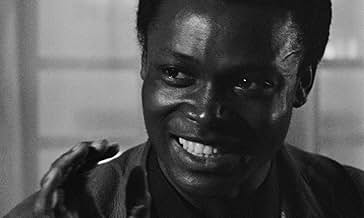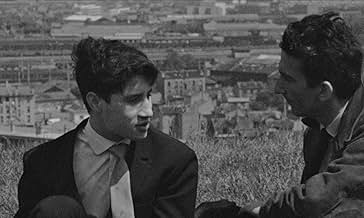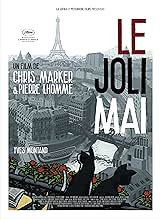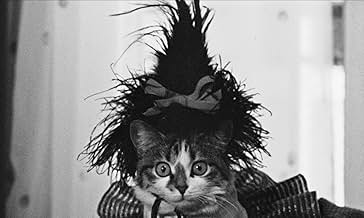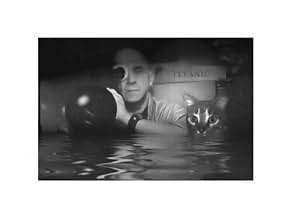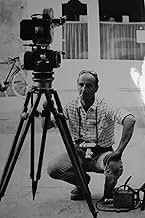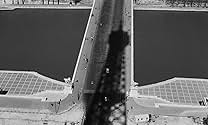Le joli mai
- 1963
- Tous publics
- 2h 45min
NOTE IMDb
7,8/10
900
MA NOTE
Un mois dans Paris, juste après la fin de la Guerre d'Algérie: le conflit qu'on essaie d'oublier, la vie de tous les jours, les petits bonheurs, les difficultés.Un mois dans Paris, juste après la fin de la Guerre d'Algérie: le conflit qu'on essaie d'oublier, la vie de tous les jours, les petits bonheurs, les difficultés.Un mois dans Paris, juste après la fin de la Guerre d'Algérie: le conflit qu'on essaie d'oublier, la vie de tous les jours, les petits bonheurs, les difficultés.
- Récompenses
- 2 victoires au total
Chris Marker
- Self
- (voix)
- …
Jean-Luc Godard
- Self
- (non crédité)
Anna Karina
- Self
- (non crédité)
Edgar Morin
- Self
- (non crédité)
Alain Resnais
- Self
- (non crédité)
Jacques Rivette
- Self
- (non crédité)
Jean Rouch
- Self
- (non crédité)
Histoire
Le saviez-vous
- AnecdotesAmong personalities viewed in the streets of Paris, this documentary shows directors Jean-Luc Godard (driving his car), Alain Resnais (as a pedestrian) , Jean Rouch (taking a drink in a bar).
- Citations
Narrator (English version): Why search for beauty in a dove and poetry in poets? When you have owls, painters, cosmonauts, inventors, lovers...
- ConnexionsEdited from Jouer à Paris (1962)
Commentaire à la une
What is extraordinary about this documentary is that it is inspired by a belief that France in May 1962 had passed a watershed, and that that dating of the watershed has proved historically accurate. For the first time since 1914 (with the exception of a brief interval in the 20s), France in May 1962 was a country living at peace, no longer battling or preparing to battle Germany, no longer fighting to hold on to its colonial possessions in Africa, the Maghreb, or Indo-China. For the first time, then, the French people are free to really consider life beyond mere physical survival, to contemplate what "happiness" means.
After May 1962 the French (like the Germans and Italians) would devote fewer and fewer resources to the military, and more and more to the civilian infrastructure (not just in terms of physical structures, but also in terms of health care, culture, education, social welfare programs to integrate the socially most disadvantaged, etc.). Looking at images of French society and French people in 1962, one is struck by how shabby things appear. That the French have one of the highest standards of living in the world today, higher by most qualitative and quantitative indices than the US, is in no small measure due to the fact that the French have lived at peace for the past 43 years.
Something which cannot be said for the US (I'm writing this shortly after the New Orleans debacle), which begins to look more and more like the shabby country France was in 1962. Marker is, of course, interested in pressing home in his interviews the possibilities that now exist (now = 1962) for greater social solidarity and equality, for going beyond a definition of "happiness" solely in terms of the possession of consumer goods, for free time and "self-realization" (as we used to say in the '60s).
That was not to happen on anything like the scale he would have liked, but it's uncanny that these interviews give us a premonition of the French spring of '68, and the sense that took hold of the Western world for a brief moment that it was possible to press beyond capitalism and create a world in which scarcity would be overcome, all would have enough, and our time would not be given over to dreary necessity but would be truly our time.
After May 1962 the French (like the Germans and Italians) would devote fewer and fewer resources to the military, and more and more to the civilian infrastructure (not just in terms of physical structures, but also in terms of health care, culture, education, social welfare programs to integrate the socially most disadvantaged, etc.). Looking at images of French society and French people in 1962, one is struck by how shabby things appear. That the French have one of the highest standards of living in the world today, higher by most qualitative and quantitative indices than the US, is in no small measure due to the fact that the French have lived at peace for the past 43 years.
Something which cannot be said for the US (I'm writing this shortly after the New Orleans debacle), which begins to look more and more like the shabby country France was in 1962. Marker is, of course, interested in pressing home in his interviews the possibilities that now exist (now = 1962) for greater social solidarity and equality, for going beyond a definition of "happiness" solely in terms of the possession of consumer goods, for free time and "self-realization" (as we used to say in the '60s).
That was not to happen on anything like the scale he would have liked, but it's uncanny that these interviews give us a premonition of the French spring of '68, and the sense that took hold of the Western world for a brief moment that it was possible to press beyond capitalism and create a world in which scarcity would be overcome, all would have enough, and our time would not be given over to dreary necessity but would be truly our time.
Meilleurs choix
Connectez-vous pour évaluer et suivre la liste de favoris afin de recevoir des recommandations personnalisées
Détails
- Date de sortie
- Pays d’origine
- Site officiel
- Langue
- Aussi connu sous le nom de
- The Lovely Month of May
- Lieux de tournage
- Société de production
- Voir plus de crédits d'entreprise sur IMDbPro
Box-office
- Montant brut aux États-Unis et au Canada
- 55 038 $US
- Week-end de sortie aux États-Unis et au Canada
- 10 662 $US
- 15 sept. 2013
- Montant brut mondial
- 55 038 $US
- Durée2 heures 45 minutes
- Couleur
- Mixage
- Rapport de forme
- 1.66 : 1
Contribuer à cette page
Suggérer une modification ou ajouter du contenu manquant



